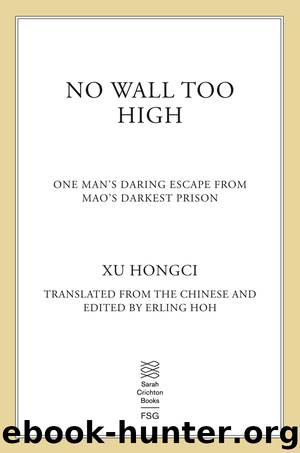No Wall Too High by Xu Hongci

Author:Xu Hongci
Language: eng
Format: epub
Publisher: Farrar, Straus and Giroux
15
No Way Home
(1965–1966)
On April 10, 1965, I had served my six-year sentence in full. But after pronouncing me officially “released,” Li Yuanlin informed me that I would not be allowed to return to Shanghai and would have to remain at Lamagu as a liuchang renyuan, “post-sentence detainee.”
Despondent, I moved my belongings down the hill to the dormitory for liuchang renyuan, which in any case was an old prison block. I knew there would be little difference between life as a post-sentence detainee and that of a convict. At least I was allowed to make myself a proper bed out of a few wooden planks and didn’t have to report to the guards when I needed to take a piss at night.
The thought of spending the rest of my life in this remote mountain valley was unbearable. On the other hand, any rebellion by me would be sure to incur the wrath of the Communist dictatorship, with unforeseeable consequences. Faced with this agonizing choice, I decided to bide my time and settled into life as a liuchang renyuan.
The Communist Party takes a peculiar view of justice. Once it has deprived you of your freedom, it will never restore it completely. Detainees are only marginally freer than convicts and are definitely not considered full citizens. If you behave well as a detainee, you might have your maozi, “cap,” the official stigma in your dossier, removed, but no matter how hard you work, the party will never let you out of its sight, and you will always be a second-class citizen barred from better positions, sometimes even prohibited from studying.
Soon after, Li Yuanlin asked me to be the prison doctor at the mine. Initially, I hesitated, well aware there would be conflicts with the leadership, but after his repeated requests I accepted the job. For the sake of convenience, I was allowed to live by myself in a room in the old prison block and cared for the detainees who lived above me.
The economy that year was rather good, especially in Yunnan, where policies such as the free trade of pork had brought the markets back to life. With better food, the number of patients suffering from TB and edema dropped dramatically, and our workload was reduced. The most common complaints were external injuries, arthritis, and stonecutter’s lung.
I often stayed in my room reading books on medicine, science, Marxism, and literature. Li Yuanlin wanted me to study Chinese medicine and gave me a few books on the subject, but having leafed through them, I found myself unable to stomach the unscientific approach. This annoyed Li Yuanlin, who made it into a political issue and accused me of being a yangnu, “slave to the West.”
After my “release,” I received several letters from Mother with news about our family. My paternal grandmother had died of gastrointestinal inflammation during the Great Leap Forward. My younger brother, Hongnian, having served three years in a labor reform camp, had gone way out west to Yining in Xinjiang, on the border with Kazakhstan, to live with the younger of my two sisters, Yunqing.
Download
This site does not store any files on its server. We only index and link to content provided by other sites. Please contact the content providers to delete copyright contents if any and email us, we'll remove relevant links or contents immediately.
| Arms Control | Diplomacy |
| Security | Trades & Tariffs |
| Treaties | African |
| Asian | Australian & Oceanian |
| Canadian | Caribbean & Latin American |
| European | Middle Eastern |
| Russian & Former Soviet Union |
The Secret History by Donna Tartt(16634)
The Social Justice Warrior Handbook by Lisa De Pasquale(11490)
Thirteen Reasons Why by Jay Asher(7792)
This Is How You Lose Her by Junot Diaz(5777)
Weapons of Math Destruction by Cathy O'Neil(5039)
Zero to One by Peter Thiel(4827)
The Myth of the Strong Leader by Archie Brown(4790)
Promise Me, Dad by Joe Biden(4451)
Beartown by Fredrik Backman(4421)
Stone's Rules by Roger Stone(4418)
How Democracies Die by Steven Levitsky & Daniel Ziblatt(4400)
The Fire Next Time by James Baldwin(4345)
100 Deadly Skills by Clint Emerson(4080)
A Higher Loyalty: Truth, Lies, and Leadership by James Comey(4034)
Rise and Kill First by Ronen Bergman(4013)
The David Icke Guide to the Global Conspiracy (and how to end it) by David Icke(3884)
The Farm by Tom Rob Smith(3873)
Secrecy World by Jake Bernstein(3784)
The Doomsday Machine by Daniel Ellsberg(3733)
